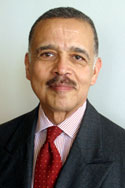ARCHIVES
OF EDITORIALS
May 19, 2005
Another fallen hero
Thurgood Marshall became an African American hero
when he won Brown v. Board of Education in 1954. Dr. Kenneth Clark,
whose psychological research was critical to the success of the
case, is not so well known. Dr. Clark died recently at the age
of 90.
The primary burden in the Brown case was to persuade the U.S.
Supreme Court to overrule a decision which had been the law since
1896. The court held then that it was not unconstitutional to
discriminate by race if the facilities were “separate but
equal.” The case of Plessy v. Ferguson had become a barrier
to racial desegregation.
The lawyers decided they would argue that racial separation in
education, as a matter of law, was inherently unequal. They called
upon Dr. Clark to prepare evidence that racial segregation was
psychologically damaging to black children and impaired their
capacity to learn.
Dr. Clark’s team developed a study which showed dramatically
that black students in a segregated system suffered from diminished
self-esteem. Black children in the study rejected black dolls,
which looked like them, in favor of white dolls. It is generally
recognized today that a lack of self-esteem is a severe impediment
to learning.
Back in the 1950s the plaintiff’s burden was severe because
of the long-standing doctrine of “separate but equal.”
In some jurisdictions there were brand new schools for black students.
There was no question that the facilities were equal. Nonetheless,
Dr. Clark was able to produce a psychological study that changed
the course of the Civil Rights Movement.
In his landmark opinion, Chief Justice Earl Warren stated, “Segregation
of white and colored children in public schools has a detrimental
effect upon the colored children. The impact is greater when it
has the sanction of the law, for the policy of separating the
races is usually interpreted as denoting the inferiority of the
Negro group. A sense of inferiority affects the motivation of
a child to learn. Segregation with the sanction of law, therefore,
has a tendency to [retard] the educational and mental development
of Negro children and to deprive them of some of the benefits
they would receive in a racial[ly] integrated school system.
Then Warren stated the historic words, “we conclude that,
in the field of public education, the doctrine of “separate
but equal” has no place. Separate educational facilities
are inherently unequal.” Plessy v. Ferguson was essentially
dead.
Thurgood Marshall and his team of brilliant lawyers who secured
the Brown victory deserve every accolade. However, it is also
important for African Americans to remember the enormous contribution
of Dr. Kenneth Clark, especially since the factors he brought
to light have significant current relevance.
Dr. Clark’s research showed that blacks are severely affected
by de jure segregation, but racial segregation that is not enforced
by law is also psychologically damaging. The mere fact of being
a second-class citizen and being unwelcome in many aspects of
American society can have adverse effects on blacks. That problem
has by no means been resolved more than 50 years after the Brown
decision.
It is a fact of life that many urban public schools will be racially
segregated as the demographics of cities change from white to
predominantly people of color. The unresolved problem is how to
establish high standards of behavior and self respect for black
and Latino children so that they will be self confident and inspired
to excel academically.
Home
Page

